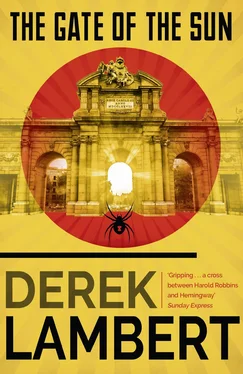When Jesús proposed marriage Ana accepted, ignoring the questions that occasionally nudged her when she lay awake beside her two sisters in the pinched house at the end of a rutted lane near the Rastro, the flea-market. Why after nearly a year was he still earning a pittance in the perpetual twilight of the museum whereas she, at his behest, had demanded a two-peseta-a-day pay rise and been granted one by an astounded hotel manager? Why did he not try to publish the poems he wrote in exercise books? Why did he not join a trade union, because surely there was a place for a museum cleaner somewhere in the ranks of the CNT or UGT?
They were married during the fiesta of San Isidro, Madrid’s own saint. The ceremony, attended by a multitude of Ana’s family, and a handful of her fiancé’s from Segovia, was performed in a frugal church and cost 20 pesetas; the reception was held in a café between a tobacco factory and a foundling hospital owned by the father of Ana’s former boyfriend, Emilio, who fooled everyone by getting genuinely drunk on rough wine from La Mancha.
Emilio, whose black hair was as thick as fur, and who had been much chided by his companions for allowing the vivacious and wilful Ana to escape, accosted the bridegroom as he made his way with his bride to the old Ford T-saloon provided by Ana’s boss. He stuck out his hand.
‘I want to congratulate you,’ he said to Jesús. ‘And you know what that means to me.’ He wore a celluloid collar which chafed his thick neck and he eased one finger inside it to relieve the soreness.
Jesús accepted the handshake. ‘I do know what it means to you,’ he said. ‘And I’m grateful.’
‘How would you know what it means to me?’ Emilio tightened his grip on the hand of Jesús, becoming red in the face, though whether this was from exertion or wine circulating in his veins was difficult to ascertain.
‘Obviously it must mean a lot,’ Jesús said, trying to withdraw his hand.
Ana, who had changed from her wedding gown into a lemon-yellow dress, waited, a dry excitement in her throat. The three of them were standing between the café where the guests were bunched and the Ford where the porter from the hotel stood holding the door open. No-man’s-land.
‘It means a lot to me,’ Emilio said thickly, ‘because Ana promised herself to me.’
‘Liar,’ Ana said.
‘Have you told him what we did together?’
‘We did nothing except hang around while you pretended to get drunk.’ What she had seen in Emilio she couldn’t imagine. Perhaps nothing: their union had been decided without any reference to her.
Emilio continued to grip the hand of Jesús, the colour in his cheeks spreading to his neck. Jesús had stopped trying to extricate his hand and their arms formed an incongruous union, but he showed no pain as Emilio squeezed harder.
The group outside the café stood frozen as though posing for a photographer who had lost himself inside his black drape.
‘We did a lot of things,’ Emilio grunted.
The porter from the hotel, who wore polished gaiters borrowed from a chauffeur and a grey cap with a shiny peak, moved the door of the Ford slowly back and forth. Fireworks crackled in the distance.
Jesús, thought Ana, will have to hit him with his left fist – a terrible thing to happen on this day of all days but what alternative did he have?
Jesús smiled. Smiled! This further aggrieved Emilio.
‘You would be surprised at the things we did,’ he said squeezing the hand of Jesús Gomez until the knuckles on his own fist shone white.
Finally Jesús, his smile broadening with the pleasure of one who recognizes a true friend, said, ‘Emilio, I accept your congratulations, you are a good man,’ and began to shake his imprisoned hand up and down.
‘ Cabrón ,’ Emilio said.
‘God go with you.’
‘Piss in your mother’s milk.’
‘Your day will come,’ Jesús said, a remark so enigmatic that it caused much debate among the other guests when they returned to their wine.
The two men stared at each other, hands rhythmically rising and falling, until finally Emilio released his grip and, massaging his knuckles, stared reproachfully at Jesús Gomez.
Jesús saluted, one finger to his forehead, turned, waved to the silent guests, proffered his arm to his bride and led her to the waiting Ford.
From the bathroom of the small hostal near the Caso de Campo, she said, ‘You handled that Emilio very well. He is a pig.’
She took the combs from her shining black hair and shed her clothes and looked at herself in the mirror. In the street outside a bonfire blazed and couples danced in its light. Would he ask her about those things that Emilio claimed they had done together?
‘Emilio’s not such a bad fellow,’ Jesús said from the sighing double bed. ‘He was drunk, that was his trouble.’
Didn’t he care?
‘He is a great womanizer,’ Ana said.
‘I can believe that.’
‘And a brawler.’
‘That too.’
She ran her hands over her breasts and felt the nipples stiffen. What would it be like? She knew it wouldn’t be like the smut that some of the married women in the barrio talked while their husbands drank and played dominoes, not like the Hollywood movies in which couples never shared a bed but nevertheless managed to produce freckled children who inevitably appeared at the breakfast table. She wished he had hit Emilio and she knew it was wrong to wish this.
In novels, the bride always puts on a nightdress before joining her husband in the nuptial bed. To Señora Ana Gomez that seemed to be a waste of time. She walked naked into the white-washed bedroom and when he saw her he pulled back the clean-smelling sheet; she saw that he, too, was naked and, for the first time, noticed the whippy muscles on his thin body, and in wonderment, and then in abandonment, she joined him and it was like nothing she had heard about or read about or anticipated.
It is true that Ana Gomez only encountered her hatred during the Civil War, but it must have been growing sturdily in the dark recesses of her soul to show its hand so vigorously.
When, slyly, was it conceived? In the black years, when one of her three brothers was beaten up by police, losing the sight of one eye, for rallying the dynamite-throwing miners of Asturias? When, at the age of 62, her father, a gravedigger, bowed by years of accommodating the dead, was sacked by the same priest who had married her to Jesús for taking home the dying flowers from a few graves? Or because the same fat-cheeked incumbent had declined to baptize her first-born, Rosana, because she had not attended mass regularly, although for a donation of 20 pesetas he would reconsider his decision … Ah, those black crows who stuffed the rich with education and starved the poor. Ana believed in God but considered him to be a bad employer.
As the hatred, unrecognized, fed upon itself. Ana noticed changes in her appearance. Her hair, pinned back with tortoiseshell combs, still shone with brushing, the olive skin of her face was still unlined and her body was still young, but there was a fierce quality in her expression that was beyond her years. She attributed this to the inadequacies of her husband.
Not that he was indolent or drunken or wayward. He cooked and scavenged and cleaned and Rosana and Pablo, who was one year old, loved him. But he cared only to exist, not to advance. Why did he not write his sonnets in blood and tears instead of pale ink? wondered Ana who, since the heady days of courtship and consummation, had begun to ask many questions. It was she who had found the shanty in Tetuan, it was she who had found him a job paying five pesetas a week more than the National Archaeological Museum. But his bean soup was still the finest in Madrid.
Читать дальше












